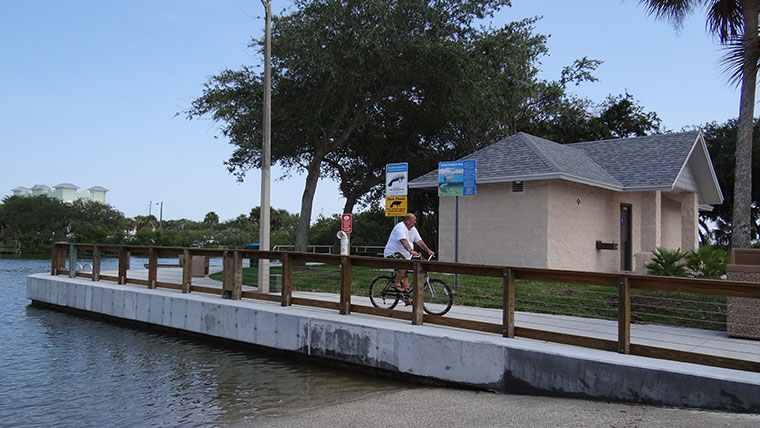As sea level rise and other climate-related issues continue to threaten our coastlines, geographic regions in Florida and across the world are gaining enhanced understanding of the benefit and importance of collaboration. Regional resiliency coalitions, collaboratives, and compacts have been formed to discuss complex issues, develop responses for resolving them, and build consensus for goals. In many coastal areas, there are several individual municipal jurisdictions along short stretches of contiguous coastline. I’ve written before about the importance of fully thinking through the ramifications of a project before following through. Unless these communities come together with a formalized and guided resilience plan, one community’s solution could be the next community’s newest concern.
Florida’s First Regional Compact
Regional climate resilience collaboration in Florida started over 10 years ago with the Southeast Florida Regional Climate Change Compact. The partnership between Southeast Florida counties formed when sea level rise effects made it clear that the region was going to need to be an early leader in facing climate change threats. Along with its objective of sharing regional climate change tools and knowledge, the Compact has increased public support and political will as a nonpartisan, credible source of information.
The Compact’s first Regional Climate Action Plan (RCAP) was published in 2012 and is updated every five years. Rather than dictating policy, which is still established by each local government, the RCAP provides a framework of best practices for emission reduction and resilience-building actions. The current version, RCAP 2.0, is an interactive tool available on the Compact’s website and allows stakeholders in the region to build customizable implementation plans based on their individual characteristics and needs.
Following South Florida’s lead, other coastal regions now have active collaborations, including the East Central Florida Regional Resilience Collaborative, the Southwest Florida Regional Resiliency Compact, and the Tampa Bay Regional Resiliency Coalition.
Tampa Bay Regional Resiliency Coalition
The Tampa Bay Regional Resiliency Coalition (TBRRC) was created in 2018. After a year spent with the Coalition Steering Committee, municipal coalition staff, and key partners to investigate resilience planning goals and initiatives from other cities and regions, the first major workshop for the Resiliency Regional Action Plan (RRAP) was held in January 2020.
The first test in resiliency was TBRRC’s response to development of the RRAP when the COVID pandemic began. In-person workshops and stakeholder gatherings were replaced by virtual half-day sessions, and small virtual breakout sessions allowed for live collaboration to provide comments on the conceptual chapters. These virtual workshops were attended by a variety of stakeholders including the local engineering community, several of whom serve as Coalition Partners.
Engagement from a broad group of stakeholders was requested by TBRRC to “ensure the plan aligns with leading practices, is consistent with leading academic research, federal and agency goals, and supports the priorities of organizations serving the communities in the region.” The first draft of the RRAP was posted for review and comment in Spring 2021, and an updated draft is expected this summer.
Statewide Planning
As an enhancement to collaboration at the regional level, Senate Bill (SB) 1954, which was approved in Florida’s 2021 legislative session, requires that the Florida Department of Environmental Protection (FDEP) create a Statewide Flood Vulnerability and Sea Level Rise Data Set and Assessment. The data set and assessment are required to initially be completed by July 1, 2023, and then updated every five years.
Funding
One of the initial challenges identified by Florida communities was funding for resiliency studies and infrastructure hardening projects. As we’ve written about before, procuring and maintaining funding for infrastructure projects can be challenging, but is definitely worth it. While the importance of the work was never questioned, budgets, especially in smaller communities, typically did not plan for projects focused solely on increasing resilience. Funding programs were initially rolled out through the US Department of Urban Development’s (HUD) Community Development Block Grant (CDBG) program. In recent years, increased funding has appeared at the national and state levels for recovery, resilience planning, and infrastructure hardening projects.
In the most recent Florida legislative session, the word “resilient” appeared more times than ever before. SB1954 created a Resilient Florida Grant Program and requires FDEP to submit an annual Statewide Flooding and Sea Level Rise Resilience Plan starting December 1, 2021 that is expected to provide up to $100 million for projects that address sea level rise and flooding risks. Recognizing the importance of regional efforts, regional resilience entities are eligible for funding under this plan. SB2514 creates the Resilient Florida Trust Fund within FDEP as a funding source for the grant program and annual Statewide and Sea Level Rise Plan.


